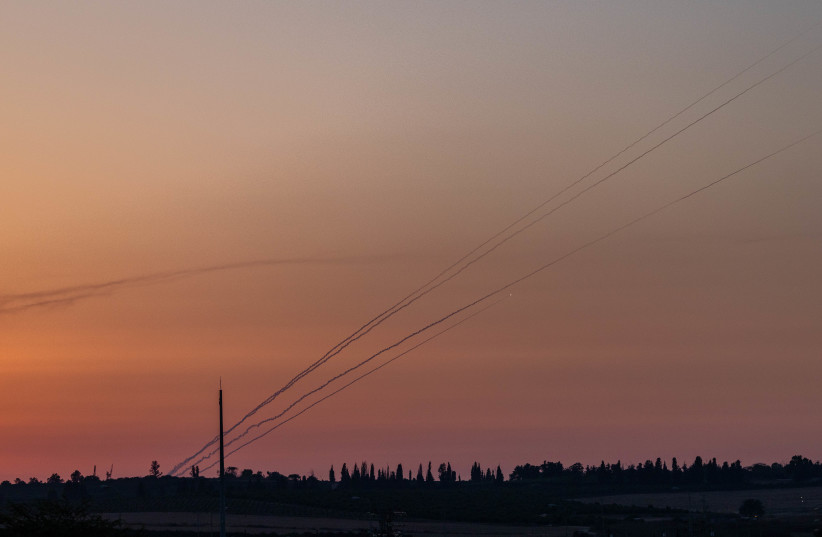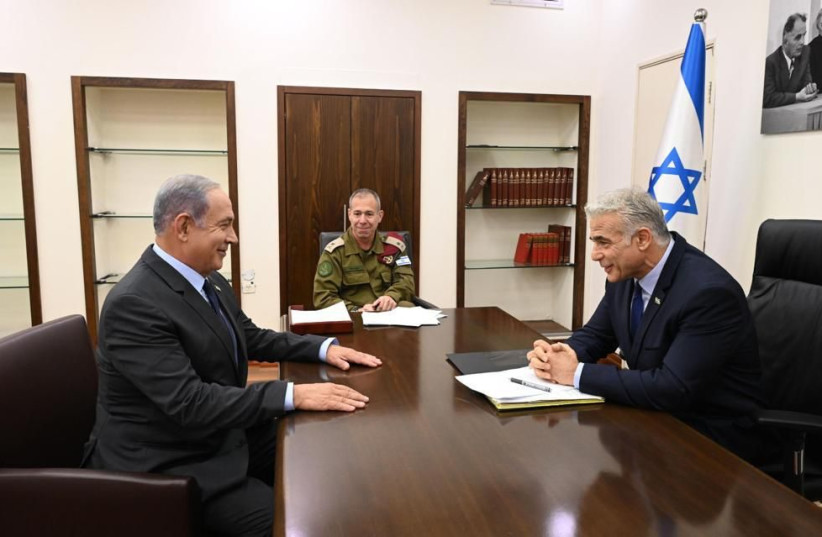On Friday afternoon, Operation Breaking Dawn began, with a few initial carefully planned (and very accurately executed) preemptive moves by the IDF, and a lot of question marks as to how long the operation will last, and what its scope and outcome will be.
Israel announced that the operation was designed (for the time being) exclusively against Islamic Jihad – the second largest armed organization in the Gaza Strip (after Hamas), which is made up of around 10,000 fighters in the Gaza Strip, who are well equipped with various sorts of arms, including rockets, has its own network of tunnels in Gaza and is financed by Iran.
The current unrest began after Israeli forces managed to apprehend the head of Islamic Jihad in the West Bank, Bassam al-Saadi, last Monday night, from his home in the Jenin refugee camp. Islamic Jihad demanded his immediate release, threatening to take revenge if Israel would not do so. Expecting the revenge to come out of the Gaza Strip, Israel imposed a partial closure in the area of settlements around the Gaza Strip, while it prepared its pinpointed operation, for Friday afternoon, in which, inter alia, Tayseer al-Jabari, the Islamic Jihad military commander of the northern Gaza Strip was killed in his home, in the center of Gaza.
Several minutes before 9 p.m., a rocket attack on Israel began from the Gaza Strip, which continued on Saturday and beyond, while Israel carried out aerial attacks on various Islamic Jihad military installations.
How long this event will continue very much depends on whether Hamas will respond to Islamic Jihad demands that it join the active attack on Israel, in which case the conflagration is liable to turn into a wider and longer operation, or whether the various external forces – including Egypt – will manage to convince Islamic Jihad to stop shooting rockets in the direction of the Israeli settlements around the Gaza Strip, the coastal plain and Gush Dan, under conditions that are acceptable to Israel.

Tensions around Breaking Dawn
At the time of writing, we do not know whether the prayers at the Kotel, and visits by Jewish groups to the Temple Mount itself on Tisha Be’av will be held without limitations or interruptions, and whether the forces prepared to enter mixed cities in Israel in the event of renewed outbreaks of inter-communal violence, will have to be called into action.
Whatever happens, this is unlikely to turn into a decisive game-changer, if for no other reason than that for many years already, Israel’s policy, whether under Likud-led governments, or alternative governments, is to preserve the status quo with minimal attacks on Israeli targets from the Palestinian side, rather than trying to change the status quo – either by means of negotiations with the Palestinians that might eventually lead to an agreed settlement of one sort or another, or by deciding to reoccupy the Gaza Strip and parts of the Palestinian Authority in the West Bank where the Palestinian administration has lost control – such as Jenin.
It is difficult to tell whether, and in what way, the current operation will affect the outcome of the elections to the 25th Knesset. Though Prime Minister Yair Lapid has announced that election politics will not play a role in the running of the operation by the government, there is no doubt that how it proceeds and its outcome will affect his own popularity and performance in the elections. It will also affect the balance of power between himself and Defense Minister Benny Gantz, who is without doubt the leading political force in the running of the operation, though Lapid, as well as Alternate Prime Minister Naftali Bennett are participating in the formal decision-making.
Leader of the opposition Benjamin Netanyahu has chosen to relate only to the military establishment – complimenting it on the execution of the operation so far. He is deliberately ignoring the role of the politicians, and is likely to continue doing so, unless something goes seriously wrong as the operation continues. Treating the current government as if it were thin air at best, and a collection of dangerous misfits at worst, has been Netanyahu’s policy since the government was sworn in on June 13, 2021. Should the current operation come to an end rapidly, and be successful from an Israeli point of view in terms of its outcome, this policy might backfire on Netanyahu. But only time will tell.
In the meantime, it was reported that Netanyahu had agreed to receive a briefing on the security situation from the prime minister’s military secretary with the presence of Lapid (or vice versa) – something he had previously rejected on principle. The briefing was set for Sunday, after this article had been handed in.
As to the Labor primary scheduled to take place on Tuesday and the Likud one on Wednesday, at the time of writing it seems unlikely that the Likud one will actually take place as scheduled, since this primary takes place in more than 100 physical polling stations spread throughout the country, quite a few of which are located within the range of the rockets being launched from the Gaza Strip.
I suspect that Netanyahu will not be happy about a delay in the primary because he is trying to remove from the final list various last-minute, new contenders who will not necessarily be loyal to him, and this in addition to his concern that the make-up of the final list will not attract moderate, more stately voters, whom he believes he needs to muster a majority of the Knesset seats.

On the other hand, the Labor primary is likely to take place on Tuesday as planned, since it is designed to take place online, even though there will be four physical polling stations – in Jerusalem, Tel Aviv, Haifa and Beersheba – for those who prefer coming physically to vote.
The Likud and Labor primaries are not really comparable, even though both parties have held primaries to select their lists for the elections since the early 1990s. This is primarily because the Likud is expected to receive around 35 seats in the 25th Knesset, and has good chances of heading the next government, while Labor will be happy to keep the seven seats it currently has (but will most likely receive less), and might not be a member of the next government, even if it will be formed by Lapid or Gantz.
Nevertheless, I dare say that despite all the bragging in the Likud about its being the only truly democratic party in Israel in terms of how its candidates are selected, the Labor primary is much more democratic and less subject to manipulation, even though Labor leader Merav Michaeli has made known who her favorite candidates are.
However, she hasn’t tried to obstruct anyone’s participation in the primary, and compared to some of the rather gruesome stories that have surfaced connected to Likud’s primaries, the Labor Party’s primaries appear to be spick-and-span, even if somewhat boring.
The writer, born in Haifa in 1943, worked in the Knesset for many years as a researcher and has published extensively both journalistic and academic articles on current affairs and Israeli politics. Her most recent book is: Israel’s Knesset Members - A Comparative Study of an Undefined Job.
